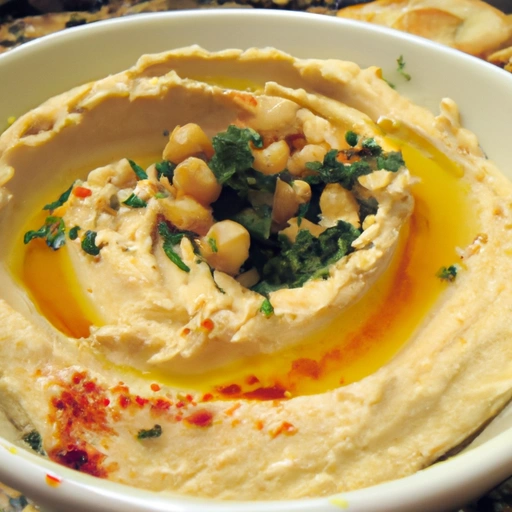Hummus
Description

Hummus is a creamy, savory spread widely popular in Middle Eastern cuisine and enjoyed around the world. It’s typically made from cooked, mashed chickpeas blended with tahini, olive oil, lemon juice, garlic, and various seasonings. Hummus has a rich, nutty flavor with a smooth and thick consistency, making it an ideal dip or spread.
Common uses
Hummus is commonly used as a dip for vegetables and pita bread, a spread for sandwiches and wraps, or as a savory addition to bowls and salads. It is also a frequent component in mezze platters, alongside other dips and appetizers.
Nutritional value
Calories
A typical serving of hummus (approximately 2 tablespoons or 30 grams) contains around 70 calories.
Protein
Hummus provides about 2 grams of protein per serving, making it a good plant-based protein source.
Fat
The fat content in hummus is primarily from tahini and olive oil, contributing to about 5 grams of healthy fats per serving.
Carbohydrates
Each serving of hummus has about 6 grams of carbohydrates, of which 2 grams are dietary fibers.
Vitamins
Hummus contains vitamins such as Vitamin B6 and Vitamin C, which are essential for various body functions.
Minerals
It is also rich in minerals like magnesium, iron, and potassium.
Health benefits
Hummus is a nutrient-dense food that contributes to heart health, aids in digestion due to its fiber content, and supports muscle function with its protein and mineral contents.
Potential risks
While hummus has many health benefits, it is calorie-dense and should be consumed in moderation, especially by individuals monitoring their calorie intake. Some store-bought hummus may contain added preservatives or sodium, which could be a concern for those on a low-sodium diet.
Common recipes
Popular recipes featuring hummus include traditional hummus bi tahini, hummus bowls topped with vegetables and protein, and hummus-based salad dressings.
Cooking methods
Hummus doesn’t require cooking and is most often served cold or at room temperature, but it can be incorporated into warm dishes.
Pairing with other ingredients
Hummus pairs well with a variety of foods such as grilled meats, roasted vegetables, falafel, and fresh salads.
Summary
Hummus is a versatile and flavorful ingredient that has transcended its Middle Eastern roots to become a beloved dish worldwide. Its combination of health benefits and delicious taste makes it a staple in many kitchens, adaptable to a variety of culinary styles.